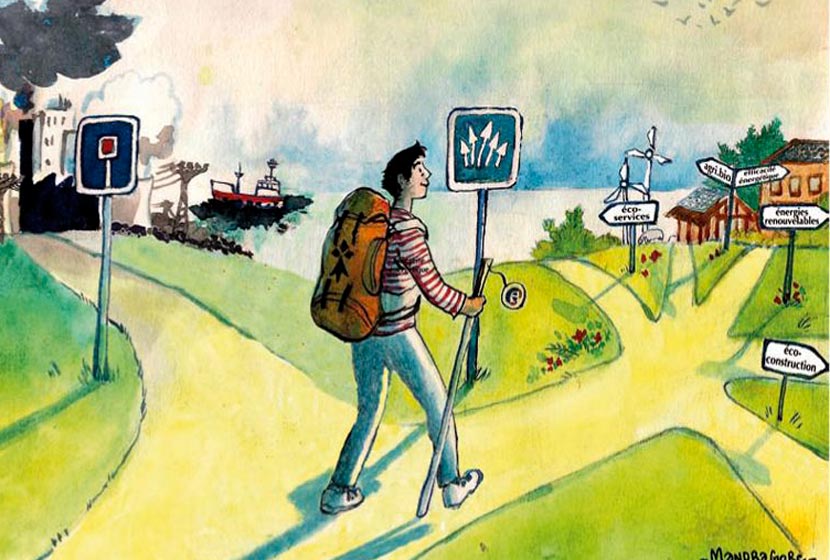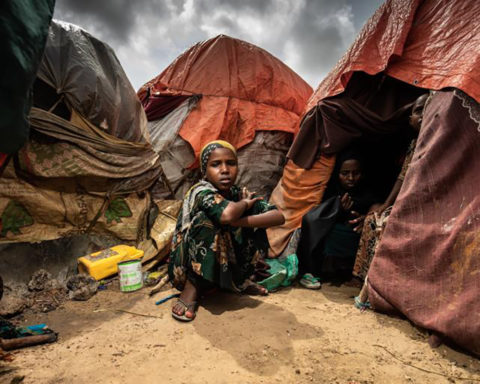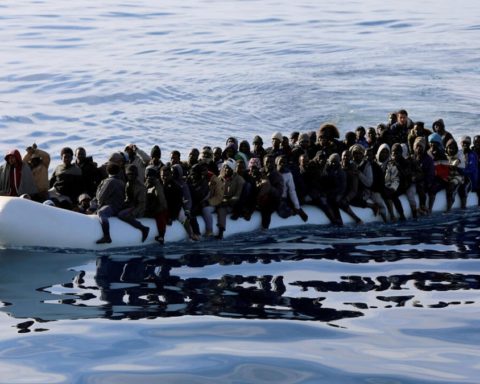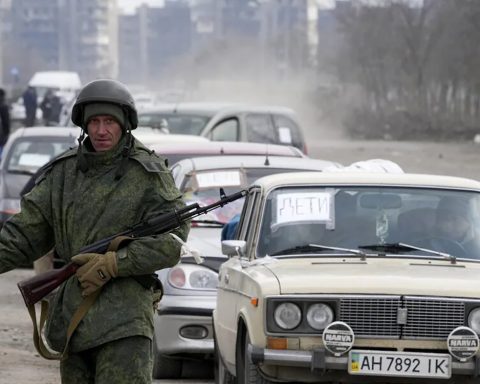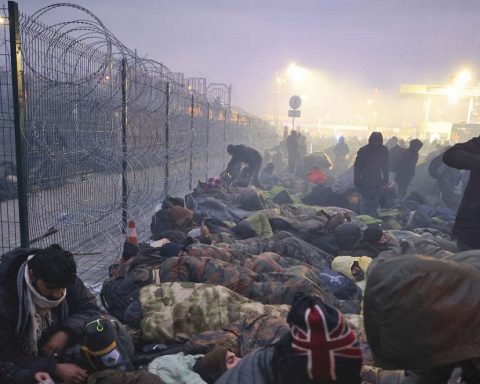"Energy transition": in recent years, this expression has been gaining ground in Europe (e.g. the Energiewende in Germany, the national debate on energy transition in France) and elsewhere, as a response to the dual challenge posed by global warming and energy peaks.
But behind a near-consensus on the need for such a transition, there remains the idea that, given the immediate urgency of employment and debt repayment, it's better to take advantage of the shale gas 'windfall', wait to learn more about climate risks, and work towards making nuclear power an intrinsically safe technology. Against a backdrop of economic and financial crisis, governments do not wish to place additional burdens on already fragile households and businesses. This is true for both "developed" and "emerging" countries, which fear that their climb out of poverty will be slowed down.
Yet inaction will not prevent the emergence of even greater social inequalities, as evidenced by the rise of fuel poverty in Europe and the demands for access to natural resources by the most marginalized in the countries of the South. The context in which the energy transition is taking place - that of an ecological crisis - calls into question our principles of social justice.
On the one hand, energy issues highlight existing inequalities, both within countries (in terms of mobility, housing, etc.) and between countries - with some consuming at the expense of others who will suffer the consequences - and between present and future generations.
On the other hand, policies designed to finance, control or reduce energy demand have social impacts which, without greater attention, risk exacerbating existing inequalities or creating new pockets of poverty.
The symposium from September 10 to 12, 2014 is therefore structured around this conviction: thinking about a viable energy transition project presupposes an understanding of the social justice issues it raises. The challenge is to go beyond the current technicist discussions on energy transition and to debate the underlying issues of social justice.
Program
- Day I: September 10 2014 /ENERGY TRANSITION: UPHEAVALS AHEAD
2pm: Opening and introduction
2:30 pm - 3:45 pm: Plenary A: 100 years of energy history
A historical perspective: energy at the heart of the industrial revolution, what are the results? What are the prospects? What scenarios for Europe's energy transition?
Nebojsa Nakicenovic, Professor of Energy Economics at the Vienna University of Technology, IPCC member
3.45pm - 4.15pm: Break
4.15pm - 6.30pm: Plenary B: Energy, revealing precariousness
What social issues does the energy transition raise? In Europe, there is growing talk of "fuel poverty". Is it distinct from poverty? What does it look like? What are the vulnerabilities of energy-producing countries?
Broadcast of an audiovisual produced by Secours Catholique.
Pablo Solon, Director of Focus on the Global South
Anousheh Karvar, IGAS inspector, former CFDT national secretary
Fabien Tocqué, Project Manager, French Red Cross
Members of the Magdala association
Moderator: Jean Merckaert, Editor-in-Chief, Revue Projet
Conclusion by Sylvain Lavelle on behalf of the scientific committee: how does the energy transition challenge the principles of social justice?
7pm - 8pm: Cocktails
- Day II: September 11, 2014 / MATINEE: WHEN ENERGY EXACERBATES INEQUALITIES
9 - 11 a.m.: Parallel workshops
Workshop 1: Housing energy costs and market logic
What role do land and property market mechanisms play in the rise of "fuel poverty"? What are the levers for action? How can the renovation industry be organized to make it accessible to the most disadvantaged? How do associations and private players support these households?
Vincent Renard, economist at Iddri/ Sciences Po
Bertrand Lapostolet, Program Manager, Fondation Abbé Pierre
Jacques Llados, Club de l'Amélioration de l'Habitat representative
Guillaume Christen, environmental sociologist, University of Strasbourg
Moderator: Eric Lagandré, Project Manager, Agence nationale de l'habitat (French national housing agency)
Workshop 2: How to guarantee mobility for all?
How can we emancipate ourselves from the private car without weakening the most disadvantaged in the short term? What support and land-use policies are emerging to counter this long-term dependence? Between a hyper-mobile and immobile society, are the contours of a right to mobility taking shape?
Jean-Pierre Orfeuil, Professor of Urban Planning at the Institut d'Urbanisme de Paris
Bénédicte Tilloy, Director SNCF- Transilien
Sandrine De-boras, innovation manager, Transdev France
Audrey Berry, doctoral student in economics, Cired
Moderator: Bertrand Hériard Dubreuil, Director of CERAS
Workshop 3: Energy versus food?
How can we manage land-use conflicts between food and energy production? Faced with rising prices for agricultural production, will we have to choose between the income of poor farmers and that of poor consumers? What are the alternatives for overcoming these dilemmas?
Michel Petit, associate at the Institut Agronomique Méditerrannéen de Montpellier
Geneviève Savigny, member of the European Coodination Via Campesina
Almuth Ernsting, co-director of Biofuelwatch
Moderator: Michel Griffon, IEA President
11 a.m. - 11:30 a.m.: Break
11:30am - 1pm Plenary C: The consumer society in question
The energy transition calls into question the way of life of Western societies, inextricably linked to abundant, inexpensive energy. Consumption, anchored in habitus, is also a means of distinction and an expression of social status. What imaginary world does a more sober society appeal to? What lifestyles, what economic and social models can we invent to respect present and future generations?
Dominique Méda, Professor of Sociology, Université Paris-Dauphine Matthieu Calame, Director, Fondation Pour le Progrès de l'Homme Daniel Maciel, representative, Magdala association
Bénédicte Madelin, former director of Profession Banlieue
Moderator: Philippe Frémeaux, editorial writer for Alternatives Economiques, President of the Institut Veblen
1pm - 2pm Lunch break
AFTERNOON: POLITICAL CHOICES PUT TO THE TEST OF JUSTICE
2 - 4 pm parallel workshops
Workshop 4: What career transitions?
The enormous net job creation potential of the energy transition is regularly highlighted. But what kind of jobs and professions are we talking about? For whom are they intended, and what qualifications do they require? How can we manage short-term job reconversions?
Anabella Rosemberg, International Trade Union Confederation
Philippe Quirion, CNRS Research Director at Cired
Christophe Rynikiewiecz, Researcher, Energy Group, University of Sussex, Moderator: Thibault De Jaegher, Editorial Director, L'Usine Nouvelle
Workshop 5: Taxation, an essential lever for the energy transition
The mutations implied by an energy transition will necessarily reinforce tensions between social justice, purchasing power, competitiveness and employment. How can taxation be one of the possible levers for alleviating these tensions? How can it be conceived as an element of a new social compromise?
Susanne Ackerfeldt, Advisor to the Swedish Ministry of Finance
Aldo Ravazzi Douvan, advisor to the Italian Ministry of the Environment
Guillaume Sainteny, Senior Lecturer at the Ecole Polytechnique*, France
Cédric Rio, Doctor of Philosophy, University of Poitiers
Moderator: Bernard Perret, French Ministry of the Environment, Sustainable Development and Energy
Workshop 6: Energy mix: controversial technologies and unstable regulations
Technological controversies aside, the energy sector is undergoing major changes in the regulatory systems that govern it. How can we overcome the sources of tension in this debate? What are the advantages of systems that give more room to local dynamics? What obstacles stand in the way?
Dominique Finon, CNRS Research Director at Cired
Gilles Vermot Desroches, Director of Sustainable Development at Schneider Electric
Andreas Wieg, President of the German Federation of Citizen Energy Cooperatives
Meyer Teva , doctoral student at the French Institute of Geopolitics
Moderator: Jean-Charles Hourcade, CNRS Research Director, EHESS Director of Studies
4 p.m. - 4:30 p.m.: Break
4:30 pm - 6 pm Plenary D: Democracy and the challenge of transition
The energy transition calls into question the way we organize ourselves collectively, the way we manage resources and the way they are fairly redistributed. Which players really influence these decisions? What are the procedures for debating options, controversies and initiatives? What social experiments can shed light on the link between the short, medium and long terms of transition?
Andrew Dobson, Professor of Political Science at Keele University
Patrice Le Roué, CFTC representative
Catherine Larrieu, former Head of Delegation for Sustainable Development, French Ministry of Ecology and Sustainable Development
Nicolas Benvegnu, sociologist, researcher at Medialab (Science Po Paris) Moderator: Jade Lindgaard, journalist at Mediapart
Day III: September 12, 2014 / MATINEE : A NEW SYSTEM TO INVENT?
9 - 11 a.m. Parallel workshops
Workshop 7: The difficult financial equation of the energy transition
The energy transition requires major investment in both energy production and energy management. Taxes, household savings, money creation and debt: which financing levers should be used? How do we integrate disadvantaged populations into these schemes? What role can be played by citizens, who are increasingly looking for meaning in their savings?
Gaël Giraud, CNRS Research Director, Paris School of Economics
Pierre Ducret, CEO of Caisse des Dépôts et Consignations Climat
Jakob Mueller, Project Manager at GLS Bank*.
Moderator: Jean Merckaert, editor-in-chief, Revue Projet
Workshop 8: How to ensure access to energy for all?
How can we guarantee access for all to essential energy services if the energy transition means higher energy costs? What tariff principles and non-tariff policies are needed? How can we reform the status of the market in energy regulation? What links need to be established with overall policies to prevent social insecurity?
José Ignacio Pérez Arriaga Professor of Economics at the Pontifical University of Comillas
Catalina Duque Gomez, doctoral student in planning at LATTS
Michel Astruc, GDF Suez mediator
Rachel Guyet, researcher at CERI/ Sciences po
Modérateur : Sandrine Mathy, chercheure en economie, PACTE-
Atelier 9 : Transition énergétique: penser l’interdépendance européenne
Dans quelle mesure la politique communautaire peut-elle devenir un point d’appui pour harmoniser progressivement les initiatives nationales de transition énergétique ou au contraire exacerber les tensions qui existent ? A quel niveau et sur quels domaines la coordination de l’Europe serait nécessaire et bénéfique ?
Christian Egenhofer, chercheur au CEPS, Bruxelles
Dominique Maillard, president du directoire de RTE
Claire Roumet, directrice générale de Energicities
Luminita-Anda Mandache, doctorante en sociologie à l’université d’Arizona
Modérateur : Jean-Charles Hourcade, directeur de recherche EDDEN CNRS, directeur d’études EHESS
11 a.m. - 11:30 a.m.: Break
11h30 – 13h Plénière E : Justice sociale et transition énergétique à la veille de la COP21 (Paris, 2015)
Comment les spécificités de l’UE peuvent accélerer ou freiner une transition énergétique équi- table au niveau supranational ? Comment éviter les risques d’inaction et de paralysie politique résultant d’un discours trop consensuel au niveau international ?
Youba Sokona, conseiller spécial développement soutenable au Centre Sud
Cécile Renouard, philosophe, directrice de recherche à l’ESSEC
Pablo Solon, Director of Focus on the Global South
Pascal Canfin, ancien ministre français du développement
Modérateur : Jean Hugé, directeur de recherche à l’Institut d’Environnement et de Développement Durable de l’Université d’Anvers.
Jour III : 12 Septembre 2014 /APRÈS-MIDI : VERS UN NOUVEAU MODÈLE
13h-14h : Pause déjeuner
14h – 16h : Plénière F : Séance de clôture : Transition énergétique et justice sociale, que pouvons- nous conclure ?
Michel Griffon, président de l’Association Internationale pour une Agriculture Ecologiquement Intensive.
Bernard Perret, ministère de l’Environnement, du Développement Durable et de l’Energie.
Jacques Haers, professeur de théologie à l’Université Catholique de Louvain
16h – 16h30 : REMERCIEMENTS DE MARC ROTSAERT, président de Scribani.
Organisation
Le Ceras organise cette conférence dans le cadre du réseau jésuite européen Scribani. Le Ceras (Centre de Recherche et d’Action Sociales) est une association de loi 1901. Sa finalité principale est de promouvoir et de développer une réflexion sur les questions politiques, économiques et sociales en veillant au respect de justice sociale. Son activité se répartit autour de trois missions : accompagner les ONG engagées dans le champ social, mettre en débat les questions qu’elles portent, les former dans ses champs de compétence. Le Ceras édite la Revue Projet qui porte en particulier le souci du sort des plus fragiles et de l’avenir de la planète, de la vitalité démocratique comme des équilibres économiques et sociaux, en France, en Europe et dans le monde. Elle se veut un lieu d’échange à la fois rigoureux et accessible.
Comité scientifique :
Jean-Pierre Bompard – Vice-président Humanité et Biodiversité
Renaud Crassous – Chercheur en économie EDF
Gaël Giraud – Directeur de recherche CNRS, membre du Centre d’Economie de la Sorbonne, du LabEx REFI (Régulation Financière) et de l’Ecole d’Economie de Paris Pierre-Noël Giraud – Professeur d’Economie aux Mines-Paris Tech
Michel Griffon- Agronome du Cirad, président de l’Association internationale pour une Agriculture Ecologiquement Intensive.
Bertrand Hériard Dubreuil – Directeur du Ceras
Jean-charles Hourcade – Ex-directeur du CIRED, directeur de recherche CNRS, directeur d’Etudes EHESS
Eric Lagandré – Chargé de mission à l’Anah
Aurore Lalucq – Co-directrice de l’Institut Veblen
Hervé Le Treut – Directeur du laboratoire de météorologie de l’Ecole Normale Supérieure
Sandrine Mathy – Chercheure en économie au CNRS – PACTE EDDEN
Jean Merckaert – Rédacteur en chef de la Revue Projet
Bernard Perret- Ministère de l’Ecologie et du Développement Durable et de l’Energie
Sylvain Lavelle – Responsable Centre Ethique, Technique, Société de l’ICAM
Jean Hugé – Directeur de recherche à l’Institut d’Environnement et de Développement Durable de l’Université d’Anvers.
Location : Centre Sèvres, 35 bis, rue de Sèvres, 75006 Paris

